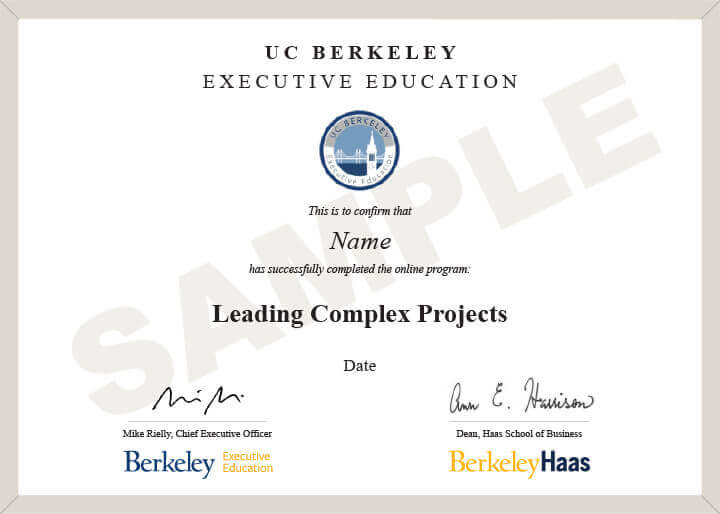The benefit of learning together with your friend is that you keep each other accountable and have meaningful discussions about what you're learning.

Courtlyn
Promotion and Events Specialist
TBD
2 months, online
4-6 hours per week
Participants report that enrolling in a program with colleagues fosters collaborative learning and amplifies their impact.
Please provide your details to get more information about the group-enrollment pricing.
The benefit of learning together with your friend is that you keep each other accountable and have meaningful discussions about what you're learning.

Courtlyn
Promotion and Events SpecialistAccording to a recent series of surveys, 89 % of our participants agree that this program will help them with the skills to build cohesive teams and improve performance and decision-making in complex projects. We also have a special group enrollment pricing for this program.
Enrolling in this program is the first step in your journey to alumni benefits.
Learn More
No matter your industry, large-scale projects are necessary to remain competitive and innovative — but they’re also expensive and time-consuming, with a high potential for mismanagement. These types of projects require leaders who understand more than just their goals. They also require an understanding of the sociopolitical, emergent, and structural complexities that are most likely to derail them. UC Berkeley Executive Education's Leading Complex Projects program is designed to help you become more strategic as a project leader by providing the tools and frameworks to help you effectively navigate these complexities and drive successful outcomes for your organization.
A PwC study of 10,640 projects by 200 organizations in 30 countries found that only 2.5% of the organizations successfully completed their projects.
According to a 2020 report by the Project Management Institute, 51% of organizations require project management professionals to have a certification for their role.
For every $1 billion invested in a project, project management issues cost organizations $119 million.
This program was designed to help mid- to senior-level professionals across industries drive their projects to success. It is ideal for:
This eight-week program provides the tools and strategies that will prepare you to lead through three of the most common types of project complexity — structural, emergent, and sociopolitical — and ensure the success of your organization’s most critical large-scale projects.
Learn what makes projects complex, how chaos and complexity affect projects, and apply complexity theory to project management.
Explore the three types of project complexity — structural, emergent, and sociopolitical complexities — and use checklist models and weighted scoring models to select and prioritize projects.
Learn the five steps to defining a project and how to lead both planned and unplanned urgent projects.
Assign resources and manage scheduling with the Integrated Project Schedule, and manage large, complex projects with tools, including The Convergence Plan, The Program Tool, and The Program Directorate.
Explore project management methodologies (traditional, iterative, and adaptive), performance evaluation methods, and learn to use complexity to deal with troubled projects.
Understand the importance and benefits of risk management, explore qualitative and quantitative risk assessment, and learn to deal with complex projects with a large number of dependencies and external factors.
Explore stakeholder management and change management, learn to create high-performing teams and build successful virtual teams, and navigate change and uncertainty.
Understand the ASE leadership framework for leading complex projects — Adaptive Intelligence, Social Intelligence, and Entrepreneurial Intelligence — and learn how to govern and leverage complexity.
Learn what makes projects complex, how chaos and complexity affect projects, and apply complexity theory to project management.
Explore project management methodologies (traditional, iterative, and adaptive), performance evaluation methods, and learn to use complexity to deal with troubled projects.
Explore the three types of project complexity — structural, emergent, and sociopolitical complexities — and use checklist models and weighted scoring models to select and prioritize projects.
Understand the importance and benefits of risk management, explore qualitative and quantitative risk assessment, and learn to deal with complex projects with a large number of dependencies and external factors.
Learn the five steps to defining a project and how to lead both planned and unplanned urgent projects.
Explore stakeholder management and change management, learn to create high-performing teams and build successful virtual teams, and navigate change and uncertainty.
Assign resources and manage scheduling with the Integrated Project Schedule, and manage large, complex projects with tools, including The Convergence Plan, The Program Tool, and The Program Directorate.
Understand the ASE leadership framework for leading complex projects — Adaptive Intelligence, Social Intelligence, and Entrepreneurial Intelligence — and learn how to govern and leverage complexity.
Capstone Project: The two-month Leading Complex Projects program culminates with a capstone project in which you create a strategy to navigate structural, emergent, and sociopolitical complexities of your own project.
Download Brochure
Videos

Reflections

Polls

Discussions

Try-It Activities

Crowdsourced activities

Quizzes

Assignments

Peer Reviews

Capstone

Case Studies

Notable Guest Speakers

Live Sessions

Live Office Hours

Demonstrations

Simulations
To get a clear understanding of how businesses mitigate risks and achieve project goals, you will examine several case studies involving these prominent companies:

Learn how Autodesk adopted Integrated Project Delivery for risk management and multi-objective optimization in building projects.

Learn how the largest used vehicle retailer in the US has undertaken a major digital transformation to become a customer-centric, product-driven organization.

Learn how a traditional organization is transformed into an agile one.

Learn how Sattva eTech manages uncertainty in the project network through the design, prototyping, and manufacturing of embedded system products.
Enrolling in the Leading Complex Projects program can become your first step toward pursuing the UC Berkeley Executive Education Certificate of Business Excellence (COBE). The Certificate of Business Excellence gives individuals the opportunity to acquire and hone new skills and do it on a timeline that works with your busy schedule. Participants will earn a mark of distinction with certification from a world-class university, and enjoy the flexibility of completing the program in up to three years.
Learn more about the program and associated alumni benefits here.
Networking and events
Exclusive Berkeley Resources
News and communication
Note: All benefits subject to change.

Get recognized! Upon successful completion of the program, UC Berkeley Executive Education grants a verified digital certificate of completion to participants. Participants must complete 80% of the required activities including a capstone project (if any) to obtain the certificate of completion. This program also counts toward a Certificate of Business Excellence.
Successful completion of this program fulfills two curriculum days (minimum requirement of 17 curriculum days) towards the UC Berkeley Certificate of Business Excellence (COBE).
Learn more on how it works here.
Note: This program results in a digital certificate of completion and is not eligible for degree credit/CEUs. After successful completion of the program, your verified digital certificate will be emailed to you in the name you used when registering for the program. All certificate images are for illustrative purposes only and may be subject to change at the discretion of UC Berkeley Executive Education.

After reviewing the information on the program landing page, we recommend you submit the short form above to gain access to the program brochure, which includes more in-depth information. If you still have questions on whether this program is a good fit for you, please email learner.success@emeritus.org, and a dedicated program advisor will follow-up with you very shortly.
Some programs do have prerequisites, particularly the more technical ones. This information will be noted on the program landing page, as well as in the program brochure. If you are uncertain about program prerequisites and your capabilities, please email us at the ID mentioned above.
Note that, unless otherwise stated on the program web page, all programs are taught in English and proficiency in English is required.
More than 50 percent of our participants are from outside the United States. Class profiles vary from one cohort to the next, but, generally, our online certificates draw a highly diverse audience in terms of professional experience, industry, and geography — leading to a very rich peer learning and networking experience.
Check back to this program web page or email us to inquire if future program dates or the timeline for future offerings have been confirmed yet.
Each program includes an estimated learner effort per week. This is referenced at the top of the program landing page under the Duration section, as well as in the program brochure, which you can obtain by submitting the short form at the top of this web page.
We have designed this program to fit into your current working life as efficiently as possible. Time will be spent among a variety of activities including:
The program is designed to be highly interactive while also allowing time for self-reflection and to demonstrate an understanding of the core topics through various active learning exercises. Please email us if you need further clarification on program activities.
More than 300,000 learners across 200 countries have chosen to advance their skills with Emeritus and its educational learning partners. In fact, 90 percent of the respondents of a recent survey across all our programs said that their learning outcomes were met or exceeded.
All the contents of the course would be made available to students at the commencement of the course. However, to ensure the program delivers the desired learning outcomes the students may appoint Emeritus to manage the delivery of the program in a cohort-based manner the cost of which is already included in the overall course fee of the course.
A dedicated program support team is available 24/5 (Monday to Friday) to answer questions about the learning platform, technical issues, or anything else that may affect your learning experience.
Peer learning adds substantially to the overall learning experience and is an important part of the program. You can connect and communicate with other participants through our learning platform.
Each program includes an estimated learner effort per week, so you can gauge what will be required before you enroll. This is referenced at the top of the program landing page under the Duration section, as well as in the program brochure, which you can obtain by submitting the short form at the top of this web page. All programs are designed to fit into your working life.
This program is scored as a pass or no-pass; participants must complete the required activities to pass and obtain the certificate of completion. Some programs include a final project submission or other assignments to obtain passing status. This information will be noted in the program brochure. Please email us if you need further clarification on any specific program requirements.
Upon successful completion of the program, you will receive a smart digital certificate. The smart digital certificate can be shared with friends, family, schools, or potential employers. You can use it on your cover letter, resume, and/or display it on your LinkedIn profile.
The digital certificate will be sent approximately two weeks after the program, once grading is complete.
No, only verified digital certificates will be issued upon successful completion. This allows you to share your credentials on social platforms such as LinkedIn, Facebook, and Twitter.
UC Berkeley Center for Executive Education, dba Berkeley Executive Education, is a California nonprofit organization formed for the purpose of operating executive education programs in support of UC Berkeley and the Haas School of Business.
No, there is no alumni status granted for this program. In some cases, there are credits that count toward a higher level of certification. This information will be clearly noted in the program brochure.
You will have access to the online learning platform and all the videos and program materials for 12 months following the program start date. Access to the learning platform is restricted to registered participants per the terms of agreement.
Participants will need the latest version of their preferred browser to access the learning platform. In addition, Microsoft Office and a PDF viewer are required to access documents, spreadsheets, presentations, PDF files, and transcripts.
Yes, the learning platform is accessed via the internet, and video content is not available for download. However, you can download files of video transcripts, assignment templates, readings, etc. For maximum flexibility, you can access program content from a desktop, laptop, tablet, or mobile device.
Video lectures must be streamed via the internet, and any livestream webinars and office hours will require an internet connection. However, these sessions are always recorded, so you may view them later.
Yes, you can register up until seven days past the published start date of the program without missing any of the core program material or learnings.
The program fee is noted at the top of this program web page and usually referenced in the program brochure as well.
Yes, you can do the bank remittance in the program currency via wire transfer or debit card. Please contact your program advisor, or email us for details.
Yes! Please email us with the details of the program you are interested in, and we will assist you.
Please email us your invoicing requirements and the specific program you’re interested in enrolling in.
Yes, the flexible payment option allows a participant to pay the program fee in installments. This option is made available on the payment page and should be selected before submitting the payment.
Please connect with us via email for assistance.
Emeritus collects all program payments, provides learner enrollment and program support, and manages learning platform services.
For the program refund and deferral policy, please click the link here.